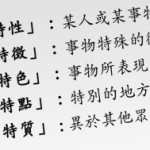Articles in the ‘Learning outside class’ category Page 20
-
Preparing for rainy days and dealing with slumps
We all experience slumps in our learning, but there are many things we can do to reduce the negative effects of these slumps. The solution is three-fold: Preparing for the slump before it hits you, finding learning activities that don’t feel like work and paying attention to what you feel capable of at the moment. You will still experience slumps, but hopefully they will be less severe!
Read → -
Your slumps affect your language learning more than your flows
There are people who go on binges and study like maniacs for short periods of time, but then run out of steam and have slump lasting considerably longer. The problem with this kind of studying is that it really affects your average output. The best is to have a steady, regular performance that gives you the mileage you need without burning yourself out completely. This article examines this problem in greater detail and gives some suggestions for how to improve your slumps.
Read → -
About fossilisation and improving your Chinese pronunciation
It’s a fact that most foreign adults don’t acquire native like pronunciation in Chinese, but what’s the reason? In most debates at this point, someone will throw in the word “fossilisation”, as if that actually explained anything. This article is about why the concept of fossilisation is bunk and how we should think about adult pronunciation instead.
Read → -
What’s your next step to master Chinese?
Procrastination is a major problem facing anyone trying to learn Chinese outside class (which should include almost everyone because if you only do what you’re required to do in class, you won’t get very far). In this article, I share some ideas on how I handle big projects and intimidating tasks. The gist is that you need to break things down and you need to know what your next action is.
Read → -
5 websites to help answer your questions about Chinese
It’s not always easy to know where to go when you fail to find answers to your Chinese-related questions. This article gives some advice on how to ask for help online and also introduces five websites that offer help in various forms for free.
Read → -
Why manually adding and editing flashcards is good for you
Creating your own flashcard is not a waste of time, even if you can find the deck you want on the internet. I have created a fair number of public decks and wouldn’t have downloaded those decks even if they would have been available at the time. Creating your own flashcards gives you control over your deck and facilitates learning in many other ways.
Read → -
The get-back-up-to-speed summer challenge
This is a challenge to encourage readers (and myself) to get more out of the remaining weeks of the summer. I have huge Anki and skritter queues and I plan to fight the down to zero before September 1st. You might need to study more vocabulary or you might have other things you want to complete this summer. Will you join the challenge?
Read → -
Role-playing as a way to expand your Chinese
When learning a language, we naturally become very good at what we do often, but expanding our knowledge beyond our personal sphere of experience is an essential step to take. Role-playing is a useful tool that can be employed to take this step. Practice with a friend and create new situations or new persons, all depending on which area you feel you need to improve in.
Read → -
Dealing with near-synonyms in Chinese as an independent learner
Near-synonyms cause major headaches for language learners and it’s especially hard for Chinese learners due to the lack of adequate resources in English. This article suggests some ways of handling the problem of near-synonyms when learning Chinese.
Read → -
If you think spaced repetition software is a panacea you are wrong
Spaced repetition software (SRS) is widely discussed online, and generally speaking, there is a spectrum between people who think SRS is the holy grail of learning anything and those that think SRS is artificial, passive and just a waste of time. This article argues that this polarisation is a serious mistake, SRS is a tool and like any other tool, how we use it determines what we get from it.
Read →








